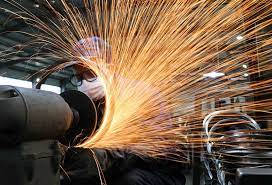
Declining for the third consecutive month and weakening more than anticipated, China's manufacturing activity cast doubt on the country's prospects for economic recovery and strengthened the case for additional stimulus measures in the coming year.
In order to support the weak post-pandemic recovery that is being hindered by a severe property downturn, dangers associated with local government debt, and weak global demand, the government has recently implemented a number of programmes. However, the second-biggest economy in the world is still having trouble taking off.
According to an official factory survey released on Sunday, the official purchasing managers' index (PMI) dropped to 49.0 in December from 49.4 the previous month. This figure is below the 50-point threshold that separates growth from contraction and is lower than the consensus prediction of 49.5 in a Reuters poll.
"We must step up policy support, otherwise the trend of slowing growth will continue," said Nie Wen, an economist at Hwabao Trust. Nie expects the central bank to cut interest rates and banks' reserve requirement ratios (RRR) in the coming weeks.
"Falling prices have greatly affected companies' profits and further affected people's employment and incomes. We may see a vicious cycle," he said.
Amid indications of increasing deflationary pressures, China's central bank announced on Thursday that it will intensify policy changes to boost the economy and encourage a price rebound.
Leading Chinese officials promised to do more this month to help the recovery in the upcoming year during a crucial meeting to determine the economic path for 2024.
On December 22, the third set of interest rate reduction this year by five of China's biggest state banks may facilitate the central bank's shift towards loosening monetary policy.
Analysts predict that the government, which announced plans in October to sell 1 trillion yuan ($140.89 billion) in sovereign bonds to finance investment projects, will concentrate on more fiscal measures to promote growth in the upcoming year.
November saw the greatest drop in China's consumer prices in three years as the country's factory-gate deflation intensified due to sluggish domestic demand.
"The current external environment is increasingly complex, severe, and uncertain," the statistical bureau said.
"Some companies in the survey reported that reduced overseas orders and insufficient domestic effective demand are the main difficulties faced by the companies."
The PMI survey published by the National Bureau of Statistics showed that the new orders sub-index was at 48.7, declining for the third consecutive month.
The new export orders indicator registered 45.8 in December, indicating a decline for the ninth consecutive month, indicating that weak external demand continued to be a significant hindrance on factory activity.
For the third consecutive month, the factory gate pricing sub-index fell to 47.7, adding to the deflationary impact on corporate profitability.
Thanks to a rebound in the sizable services sector, the official non-manufacturing purchasing managers' index (PMI), which covers construction and services, increased to 50.4 from 50.2 in November.
China's economic growth is predicted to reach the stated goal of about 5% this year, and Beijing is anticipated to stick with the plan for the following year.
(Source:www.asia.nikkei.com)
In order to support the weak post-pandemic recovery that is being hindered by a severe property downturn, dangers associated with local government debt, and weak global demand, the government has recently implemented a number of programmes. However, the second-biggest economy in the world is still having trouble taking off.
According to an official factory survey released on Sunday, the official purchasing managers' index (PMI) dropped to 49.0 in December from 49.4 the previous month. This figure is below the 50-point threshold that separates growth from contraction and is lower than the consensus prediction of 49.5 in a Reuters poll.
"We must step up policy support, otherwise the trend of slowing growth will continue," said Nie Wen, an economist at Hwabao Trust. Nie expects the central bank to cut interest rates and banks' reserve requirement ratios (RRR) in the coming weeks.
"Falling prices have greatly affected companies' profits and further affected people's employment and incomes. We may see a vicious cycle," he said.
Amid indications of increasing deflationary pressures, China's central bank announced on Thursday that it will intensify policy changes to boost the economy and encourage a price rebound.
Leading Chinese officials promised to do more this month to help the recovery in the upcoming year during a crucial meeting to determine the economic path for 2024.
On December 22, the third set of interest rate reduction this year by five of China's biggest state banks may facilitate the central bank's shift towards loosening monetary policy.
Analysts predict that the government, which announced plans in October to sell 1 trillion yuan ($140.89 billion) in sovereign bonds to finance investment projects, will concentrate on more fiscal measures to promote growth in the upcoming year.
November saw the greatest drop in China's consumer prices in three years as the country's factory-gate deflation intensified due to sluggish domestic demand.
"The current external environment is increasingly complex, severe, and uncertain," the statistical bureau said.
"Some companies in the survey reported that reduced overseas orders and insufficient domestic effective demand are the main difficulties faced by the companies."
The PMI survey published by the National Bureau of Statistics showed that the new orders sub-index was at 48.7, declining for the third consecutive month.
The new export orders indicator registered 45.8 in December, indicating a decline for the ninth consecutive month, indicating that weak external demand continued to be a significant hindrance on factory activity.
For the third consecutive month, the factory gate pricing sub-index fell to 47.7, adding to the deflationary impact on corporate profitability.
Thanks to a rebound in the sizable services sector, the official non-manufacturing purchasing managers' index (PMI), which covers construction and services, increased to 50.4 from 50.2 in November.
China's economic growth is predicted to reach the stated goal of about 5% this year, and Beijing is anticipated to stick with the plan for the following year.
(Source:www.asia.nikkei.com)





